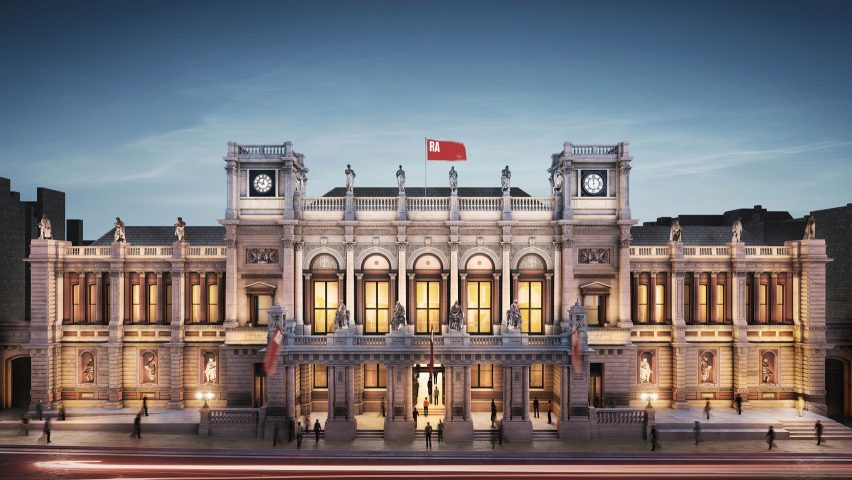The Royal Academy of Arts in London has unveiled ambitious plans for a new architecture centre and awards programme "to deepen the public's understanding of architecture and to inspire the profession", thanks to a seven-figure donation.
The plans will see the RA – traditionally viewed as a fairly conservative institution dedicated the fine arts – become a major player in contemporary architecture.
Writing on Facebook, RIBA Journal editor Hugh Pearman described the plans as "parking various tanks on various architectural lawns".
The project will be completed as part of a major renovation of the Burlington Gardens building, being carried out by architect David Chipperfield. The plans were first announced in 2015 but have now been updated to include the new "permanent home" for the institution's architecture programme.
The Architecture Studio, or Dorfman Senate Rooms, will host temporary architecture exhibitions in a space adjacent to a new day-lit lecture theatre.
"The RA is perfectly placed to lead an inclusive and vital discussion on architecture, championing quality, creativity and courage," said the academy's head of architecture, Kate Goodwin, at a press conference this morning.
"It will not be a traditional exhibition space but will provide a place where people can come together."
The RA's chief executive Charles Saumarez Smith said the project will allow the institution to "renew and significantly increase our commitment to architecture, realising our ambition to deepen the public’s understanding of architecture and to inspire the profession".
"When this building opens it will transform public perceptions of what the academy is," he said. "The historic building is what was originally a private house in a courtyard off Piccadilly and therefore in a way the character of the institution has been determined by the nature of the building."
An undisclosed seven-figure sum gifted to the academy by the Dorfman Foundation will contribute to the £50 million overall cost of the renovation works on the building, including the creation of the Architecture Studio.
The foundation – set up by British entrepreneur and Travelex founder Lloyd Dorfman – will also fund two new Royal Academy of Arts architecture awards.
The annual Royal Academy Architecture Prize will be awarded to an individual who has made an enduring contribution to the profession, while the Royal Academy Dorfman Award will honour emerging talent.
"The international awards will recognise the best in architecture, and again highlight the RA's role in London’s cultural life and also London's status as a world centre for architecture," said Dorfman.
The jury for the inaugural round of awards will be chaired by one of the institute's 23 architect Royal Academicians, Louisa Hutton.
The winner of the first Royal Academy Architecture Prize will be announced in January 2018, with the first laureate of the £10,000 Royal Academy Dorfman Award unveiled in May.
Saumarez Smith said that the mission of the new programme is to promote architecture as a form of art.
"Often people think of the academy in terms of art. Architects have the RIBA and so people often think that the RIBA is the architects' professional institution," he said.
"What's distinctive about the academy is that is treats architecture as an art form, so that when the RIBA was set up in 1834 it was treated as a professional discipline. At the Royal Academy [architects] sit alongside artists and they are part of a community of practitioners of the arts," he continued.
"Architecture both benefits and and sometimes suffers from the fact that there are lots of organisations doing architectural things; what I think the gift will do is raise our profile in this complex community of people involved in architectural exhibitions and lectures."
The funding boost by the Dorfman Foundation comes as the Arts Council announces cuts to the four largest recipients of its grants, the Royal Opera House, the Southbank Centre, the National Theatre and the Royal Shakespeare Company.
Lloyd Dorfman is among a number of philanthropists he sees "stepping up to the plate" to plug the funding gap.
"Private philanthropy has been stepping up to the plate to some extent and that's a great thing but against the background of the current uncertainty of Brexit, individuals are nervous, organisations are nervous and it's all not helpful," said Dorfman.
Billionaire Len Blavatnik has also funded a spate of cultural projects in the UK, including Herzog & de Meuron's extension to Tate Modern in London and Amanda Levete's new entrance for the capital's V&A museum.

